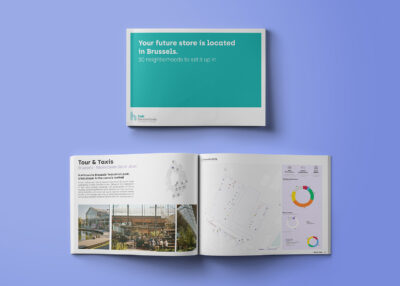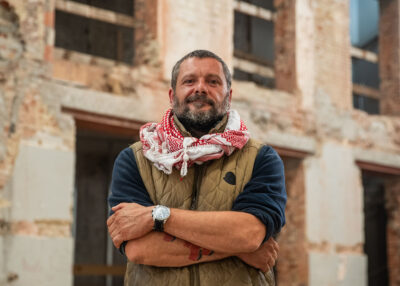
Impact of Covid-19 on female entrepreneurs in Brussels
Despite the increased difficulties and mental strain caused by the crisis, the Brussels female entrepreneurs show optimism and incredible resilience: 90% of those who testified want to continue their activity. This is what a survey of Women in Business, hub.brussels’ platform dedicated to Women in Business, shows.
Even if the crisis has increased the elements surrounding the disparities they already faced before the pandemic, the (future) Brussels female business leaders show great determination and a remarkable optimism: 77% of aspiring female entrepreneurs have the ambition to start in the coming months.
A survey to truly understand the challenges of the economic recovery
Though they represented only 28,4% of the self-employed in Brussels in 2019, there are more female entrepreneurs than in any other region of the country, in particular in the catering industry, event, tourism and cultural sectors.
In these sectors, already heavily impacted by the health measures related to Covid-19, their representation rate rises to about 45%. They also continue to face many structural barriers that often prevent them from doing business and/or being successful in the entrepreneurial world. With the federal government fully preparing to end the crisis, an analysis of the situation of women in Brussels seemed more than necessary to truly understand the challenges of the economic recovery as a whole.
A quantitative and qualitative survey
Even before the end of the pandemic, hub.brussels wanted to conduct a quantitative and qualitative survey on a participatory basis through its Women in Business platform, in order to determine the impact of the crisis on the business of women entrepreneurs in Brussels, as well as their needs and expectations in this context.
The objective of the quantitative analysis carried out online was to measure how (future) entrepreneurs experience this health crisis and to better understand their profiles, the situation of their entrepreneurial projects and their possible expectations.
The qualitative analysis was carried out in October 2020 in two focus groups. This made it possible to assess the experience and perception of the participants through the prism of experience and subjectivity.
The crisis as aggravating factor of inequalities
The results of this survey emphasize the sharpening of the elements surrounding the inequalities that Brussels female entrepreneurs already had to deal with before the outbreak of the crisis and thus reflect the concerns of many international institutions about the situation of women worldwide
“According to my three-year-old daughter, women become nurses and men doctors. It seems as if we have fewer dreams or less ambitions because of the examples we see in our society. To give women a boost to do business in Brussels, we must absolutely tackle the problem of the place of women in general. Because if we don’t, we won’t get there!”
Some figures make it possible to objectify the impact of the Covid-19 crisis on the activity of the participants: 62% of them saw turnover fall by more than 50%, and even if 51% say they still have cash, 90% say they can’t last more than six months!
Another common finding: although all businesses were hit hard, the health measures meant that mainly the women took care of the children and the household, resulting in an even greater mental burden, and that they were confronted with the difficult quest for a work-life balance.
“For me as a woman, the pressure increased both professionally and privately. (…) I had to take on family activities in addition to my job. So, I had to be very flexible. Because I can choose my own hours, I had to take care of the family in addition to my own work. This really must be taken into account. Any help to deal with this double day job as a woman is welcome.” Isabelle, 40 years old, probably one of the 40% women who, according to a study by the Foundation “Fondation des Femmes”” testified that she spent more than 4 hours a day caring for the children in the lockdown in the Spring 2020, which is twice as much as men.
Optimism and resilience
But the research also shows that more was needed to discourage the Brussels entrepreneurs who have shown incredible resilience and optimism. Of the participants, 90% want to continue their activity, while 77% have the ambition to start their project in the coming months and more than 55% plan to rethink and adapt their business model to the new economic opportunities and consumption habits
“As a person I disconnected myself from my company. I got through the lockdown well. As a self-employed person I received support and premiums to be able to survive. This allowed me to continue training. In the beginning I wanted to start my business online, but the physical business prevailed. The lockdown has taught me that my online business was not bringing me the income I was hoping for. I was able to work on it, I’ve expanded my community and it just keeps growing! So again, I can’t complain and I came out fine.” summarises 35-year-old Fati.
A round table bringing together the driving forces of female entrepreneurship in Brussels
Such optimism, such enthusiasm deserves to be further encouraged and supported through public support measures adapted to the specific situation of female entrepreneurs in the Belgian economy, and in Brussels in particular.
Barbara Trachte, State Secretary of the Brussels-Capital Region and in charge of the Economic Transition, will organize a roundtable discussion in the coming weeks in the context of the development of government actions, in which all women’s entrepreneurial networks come together. “There is a demand in the female entrepreneurship ecosystem to think about specific answers to the problems faced by female entrepreneurs. We’re working on it, with WomenInBusiness. Indeed, it is fundamental to support the public who encounter the most obstacles in starting or developing entrepreneurial projects”.
More news on our blog:

Brussels to California: keeping the American Dream alive
Posted on 27/10/2025
